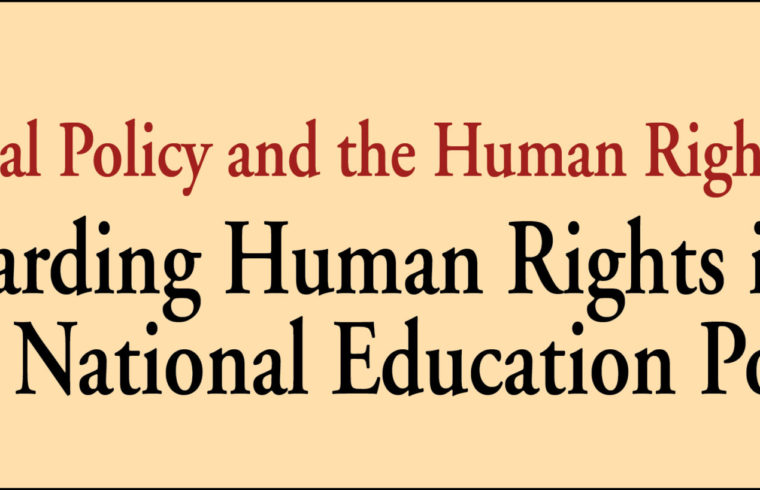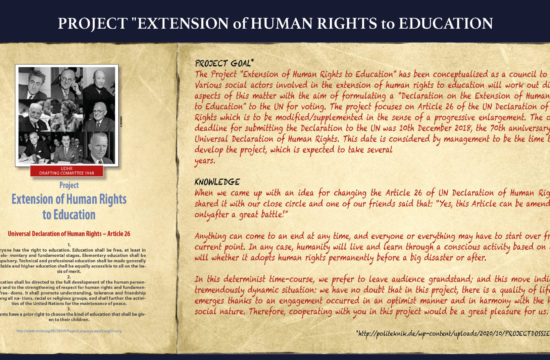20 years, 2nd year MBBS, Kasturba Medical College Manipal, Karnataka – INDIA
Safeguarding Human Rights in the new Indian National Education Policy 2020
The term “Human Rights” refers to the basic rights of being, living and leading a life under dignified humanly conditions. It means safeguarding the identities of all human beings as an individual and in collective form which contribute to their well-existence. Human Rights Education is related to identifying, respecting, acknowledging, and advocating the tenets of rights to being a human. Since the issues related to every country are unique and context-specific, education of human rights to citizens of every country are also oriented towards that particular country.
Particularly to the Indian state, the challenges of human rights exist at many levels. We live in an extremely heterogeneous society which is divided into many sections and subsections. The Indian Constitution recognised these diversities and integrated the tenets of human rights in its preamble itself. In its 86th Constitutional Amendment (2002) education of every child up to the age of 14 years was made a fundamental right. Subsequently, keeping with the spirits of Article 26 of Universal Declaration of Human Rights (1948), RTE (2009) entrusted every Indian state with the responsibility of ensuring elementary education to every child below 14 years of age.
Almost all the Education Commissions and Policies in India have been honouring the fundamental rights of every child to receive quality education. They assign special status in the national educational system to women, scheduled castes, scheduled tribes, minorities, and the differently- abled children.
The New National Education Policy, 2020 In India, a new education policy, National Education Policy 2020, has recently been launched by the current government to give a vision, mission and futuristic goals for improving the state of education in India. The last education policy was released in 1986 and it is after a period of 34 years the government has launched a framework to guide the development of education in the country. NEP 2020 an overhaul in the education system to prepare the coming generations for challenges in the global world. It wishes to promote a culture of inclusion, innovation and institution in the sphere of Indian Education.
NEP 2020 has taken utmost care in securing the human rights of all children from various cast, creed, region, religion, ability, interest, demography and gender. The concerns of inclusion of all children is dispensed in the entire document. “Education is fundamental for achieving full human potential, developing an equitable and just society, and promoting national development. Providing universal access to quality education is the key to India’s continued ascent”. Each chapter, when read carefully, highlights the pressing need of including all citizens to meaningful education.
It will be worthwhile to read the entire policy to appreciate how children’s rights have been addressed in the policy, but due to paucity of space, in this article, three most significant aspects have been discussed. We will begin by seeing how the structural change in the school education system remarks a step towards inclusion of all. Secondly, we will look at how the policy regards foundational literacy and numeracy as primal in ensuring continuation of children in school life and thirdly, the policy’s appeal to adopt multidisciplinary approach will ensure all chidden to pursue education as per their individual choice and need.
Restructuring School Education NEP, 2020 recommends a structural change in the Indian education system. The school education would now be clustered as 5+3+3+4 instead of 10+2. This structural change will help in safeguarding the right to meaningful education of all children. In the initial 5 years, steps will be taken to include all children in the age group of 3-8 years in formal schooling and well-being. In the second phase of 3 years (from Class IV-VI) efforts will be made to develop the conceptual foundations in all disciplines. The last stage of schooling spanning for 4 years from class IX to XII will prepare every adolescent for vocational as well as an academic career.
A strong base of Early Childhood Care and Education (ECCE) from age 3 years will be warranty better overall learning, development, and well-being of all children. It will be the responsibility of the state to ensure that children from socially, or culturally or economically disadvantaged backgrounds come to school or ‘Anganwadis’ (Child-Care centres). “Universal provisioning of quality early childhood development, care, and education must thus be achieved as soon as possible, and no later than 2030, to ensure that all students entering Grade 1 are school ready”.
This is a remarkable move for bringing the uncovered age group of 3-6 years under the school education. Inclusion of young children in schooling is a crucial step as it is at this stage when the mental faculties of a child develops. Further, since the medium of teaching will be mother tongue or regional language, no child would feel alienated and drop out from the school. The policy has ensured that for class 8 and below adequate flexibility and privileges will be given for successful attainment of basic education of each and every child.
Foundational Numeracy and LiteracyN EP 2020 persuades on establishing strong foundational literacy and numeracy skills. It states, “the very highest priority of the education system will be to achieve universal foundational literacy and numeracy in primary school and beyond by 2025. The rest of this Policy will be largely irrelevant for such a large portion of our students if this most basic learning requirement (i.e., reading, writing, and arithmetic at the foundational level) is not first achieved’’ (p. 8).
To attain foundational literacy and numeracy, the policy plans to provide schools with an adequate number of local teachers or those who are familiar with the local languages so that the children can learn in the language they are comfortable with. All the states and UTs are therefore suggested to establish innovative models to foster peer-tutoring and volunteer activities as well as launch other programs to support learners to attain foundational literacy and numeracy.
Multidisciplinary approach to education The policy also emphasizes on no rigid separation between academic subjects, co-curricular experiences and vocational education in schools. An orientation to vocational subjects will commence from Grade VI onwards.
The policy offers a multidisciplinary approach at all levels of education. Multidisciplinary curriculum and pedagogy will avoid segregation and isolation of children on the basis of their ethnicity, linguistic or regional status. Children from minorities and those with disabilities will have adequate opportunities to learn from the interlinkages of the subjects. Further, teaching of the rich heritage of art and culture of India is being encouraged. The students will feel motivated to learn about the diverse culture of India, its knowledge system and tradition. Knowing the heritage will sensitise the children on human values, empathy, tolerance, human rights, gender equality, inclusion, equity to develop respect for diversity.
As a concluding remark, NEP 2020 urges for equity and inclusion of all by addressing all forms of exclusion and marginalization, disparity, vulnerability and inequality in education access, participation, retention and completion and in learning outcomes.
Reference
Ministry of Human Resource Development. (2020). National Educational Policy 2020. New Delhi, India: Government of India.











